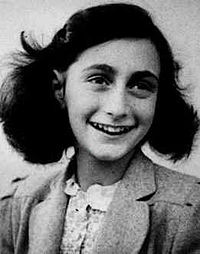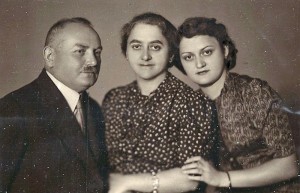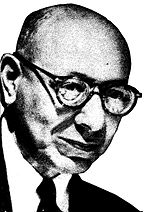
Of the many discoveries I’ve made about my extended family lately, one of the most startling was that several relatives spent the war in an attic in Holland. According to the Yad Vashem site, Johannes van den Berg and his wife, Anna, hid 14 people in their home in the town of Velp, Gelderland. Among them were Nina and Ferdinand Schmerling, their daughter, Stella Schmerling Beder, and her husband, Jack Beder. “The fugitives shared the two attic rooms,” the piece states, “and the Van den Berg sons found other places to sleep. Special hideouts were also constructed for use in times of emergency.”
Other Family Stories
I suppose I shouldn’t have been so surprised. Anne Frank, who detailed the experience in what became The Diary of a Young Girl, didn’t have a monopoly on hiding in Holland — or anywhere else. I just didn’t know that this was one of my family’s responses to the Nazi occupation.

When I thought about it, though, several ways that my relatives reacted to the Germans were new to me. I really only knew one attempted — and failed — escape strategy: By coincidence, both my mother and father were sent abroad from Vienna by their parents because the Nazis had confiscated most of their assets and there wasn’t enough money for passage for the entire family. The plan was for the children to wire money to their parents from America once they got enough. By another, even more tragic coincidence, both managed to scrape the required amount together — only to learn that the borders had closed. My parents met after they had this parallel experience; I always wondered if they found solace from having shared it or if it only doubled the couple’s pain.
But in the past year, I’ve learned about several ways my mother’s family dealt with the Nazi occupation: Some relatives fled to Shanghai together; others became Zionists and moved to Palestine, helping fellow Jews to leave Austria; one ended up in Jamaica, fighting with a Canadian unit against the Germans.
Bruno Bettelheim and Anne Frank

It was through Manfred Wolf, the nephew of the man in the Canadian unit — he wrote about a lead-in to that experience here — that I learned about a controversial essay by Austrian-born psychologist Bruno Bettelheim, perhaps best known for his Freudian analyses of fairy tales. Bettleheim, who survived Dachau and Buchenwald concentration camps, states a part of his essay’s thesis in its title: “The Popularity of Anne Frank’s Diary Denies the Real Lesson of the Holocaust.” [The essay is not available online unless you are a subscriber to Harper’s Magazine; here’s the link. I got the essay from the library in a collection called Readings on Anne Frank.]
Bettelheim writes:
It is an onerous task to take apart so humane and moving a story… but I believe that its world wide acclaim cannot be explained unless we recognize our wish to forget the gas chambers and to glorify the ability to… [cling] to the usual daily attitudes even in a holocaust.
Bettelheim considers this attitude dangerous, even fatal:
While the Franks were making their preparations for going passively into hiding, thousands of other Jews in Holland and elsewhere in Europe were trying to escape to the Free World in order to survive or to be able to fight. Others who could not do so went underground — not simply to hide from the SS and wait for the day when they would be caught — but to fight against the Germans and for humanity.
Anne’s fate was not necessary, Bettelheim contends. Many Jewish children survived the war by being sent off to live with Dutch families. “But for that she would have had to be separated from her parents,” he says, and “the main principle of the [Franks’] planning was to continue as much as possible with the kind of family life they were accustomed to.” They refused to “accept that going on with life as usual was… sometimes the most destructive of all attitudes.” Instead of teaching typical academic high school subjects to his children, Bettelheim suggests, Mr. Frank’s time would have better been spent showing them how to make a getaway if the Nazis came. And instead of buying provisions to create a pretense of normalcy, he says, the Franks should have bought a gun or two.
Back to the family
Bettelheim describes one of the alternatives to what he calls the “surrender to the death instinct” or the “principle of inertia”:
Many Jews in Poland who did not believe in life-as-usual survived the second world war. As the Germans approached, they left everything behind and fled to Russia.
This brought to mind the fact that other relatives, the family of Ezriel Kornmehl, escaped to the USSR — even though Ezriel had fought against Russia on the side of Poland only a few decades earlier.
I thought again about the members of my family who hid in Holland. I have no details about their experience but know that, happily, all four Beders and Schmerlings survived, unlike the Franks. But here’s an interesting fact. According to Elaine Schmerling, Gustel Schmerling, the son of Ferdinand and Nina and brother of Stella “wasn’t in the attic hiding, because he had already gone to Israel and helped the Hagganah smuggle Jews in.” She adds, “Why his parents and sister didn’t go is beyond me….but I guess they didn’t want to go, as many others didn’t.”
That’s pretty much the same question that Bettelheim asks.
And then something else occurred to me. I’d always thought of my grandparents’ fate as pure tragedy — and of course the fact that they died in concentration camps, when they were on the verge of being saved by their children, is horrible. But I realize now that they made smart — and brave — choices, to split up their families and send their children abroad. If they hadn’t done that, I wouldn’t be writing this essay.

Such an interesting analysis of the different choices people made when there were so few choices available. And so personal. I feel a little put out with Bettelheim, as I think people did whatever they saw as an option in the most unbelievable time of crisis. On the other hand, I spend a lot of time in Denmark and know that basically the only Jews who were not ferried safely over to Sweden were those who, not believing the unbelievable, tried to continue their lives as normally as they could. As Viktor Frankl wrote, however, we shouldn’t judge the choices anyone makes unless we can ask ourselves in all honesty whether we might not have done the same. Thank you for sharing this deeply personal family story along with thoughtful commentary, Edie.
I thought about the point Viktor Frankl made, Anna, and hoped I would not come across as judgmental about the people who chose to stay in the attic. I know very little about their circumstances. I always have to stop myself from going on at greater length — otherwise I would never get anything posted!
The larger context of the essay, which I wished I could have linked to, was Holocaust denial — by everyone, including the Jews to whom it was happening. Bettelheim attributes the popularity of the diary, and especially the play made from it — which ends with her statement that mankind is good — to the fact that people can go back to feeling complacent about the evil that occurred.
As always, I appreciate your insight.
Oh, no, Edie, I didn’t think you were being judgmental at all. I did think Bettelheim (and I don’t know how he ended up surviving Dachau and Buchenwald rather than making what he might have considered a proactive choice) was somewhat judgmental of people’s choices. The additional context about going back to complacency helps me understand him better. I know what you mean about having to post at some point or you never would. I just cannot even imagine the terror of trying to make what you hope will give you the best chance for survival in those circumstances. Along with you, I’m glad your grandparents made the choice they did, but I can’t help feeling tears for them.
Thanks, Anna. Bettelheim survived at a time when the Nazis were still releasing some prisoners from the camps.
I can’t even imagine having to make choices like that, and writing about all this continues to give me a new found respect for both my parents, who came to a strange country on their own, without knowing the language, and were powerless to save their families. It’s unfathomable, really.
Fascinating essay, Edie. I’m still digesting the issues you raise, and also trying to visualize how your family managed to make decisions about whether to go, where to go. What on earth would I do? What would I believe? Thanks.
I have a really hard time trying to imagine what I’d do — that is, I imagine all kinds of things, but doubt that I would be capable of them…
Wonderful article that addresses something I have wondered about frequently. Although my family is not Jewish, and all were already in the U.S. when the war came, the question of “what would I have done in their shoes?” has always haunted me. The exodus featured non-Jews, too.
I knew a man in Scottsdale, Paul Huldermann, who was German but not Jewish (as far as I know). He was a journalist and a liberal and strongly opposed the Nazis. He published a newspaper until it was too dangerous and then when to Shanghai, where your relatives may have read the newspaper he published there for ex-pats. Ironically, when he finally migrated to the U.S. where he could have published without problem, he instead got into trading American Indian art.
Thank you. Yes, it’s a question that you don’t have to be Jewish to contemplate. I’ll have to look through my relative’s book to find the name of the newspaper they read; I knew there were several in German; there was quite the ex-pat community. Maybe Paul Hulderman didn’t want to contemplate the news any more… very interesting.
Moving, provocative essay. Thank you.
A few small, almost random notes, not fully germane to your excellent article: BB survived Dachau in part because before the War some prisoners were still being released by the Nazis. After the war they didn’t. I believe he got out before the War.
Bettelheim’s essay seems to me to misunderstand or ignore the essentially bourgeois character of the Franks, of most of the Western European Jews: We wouldn’t have known where to buy a gun, wouldn’t have been able to use it, etc. In a tiny country like Holland, well organized, highly bureaucratic, instantly ‘overseeable’ by the occupiers, anyone doing anything out of the ordinary would’ve been arrested.
Not central to your piece, but still worth noting, I think. And a further thought: Contrast the Frank family with the Bielski (sp?) brothers immortalized in the film “Defiance.” The brothers were roughnecks, used to guns, tough guys who could handle physical hardship — AND they lived in Eastern Europe where you could hide in the woods, which had wild forests, truly isolated farmhouses, etc. Thank God they were able to do what they did, but none of it is applicable to a country like Holland, where the Jews had only three ways of escaping deportation and death: (1) hide in the cities, in some attic or cellar, the way the Franks did; (2) hide on a farm in the countryside [this was often arranged by the Resistance]; (3) escape, flee the country [which, of course, required money or connections] — our way. Only hindsight can tell us which way was best.
Thanks for these observations. You certainly have a better perspective on all this than I do, having experienced it, albeit when you were very young, but still growing up with more intimate knowledge. One point that Bettelheim makes about Anne that seems valid is that it was difficult for families to hide together, that many children were sent off to other homes to wait out the war. I also know that many people sent their children off to England on the kindertransports, though I don’t know if that was an option in all countries.
And of course in your own story you talk about the lovely little girl that your mother tried to save. I suppose the instinct to keep your loved ones with you is very difficult to overcome.
Wonderful and moving blog post Edie!
I want you to know that your blog post is listed in today’s Fab Finds post at http://janasgenealogyandfamilyhistory.blogspot.com/2013/08/follow-friday-fab-finds-for-august-23.html
Have a wonderful weekend!
Thank you so much, Jana. I really appreciate it.
Very interesting piece, Edie. I am just reading this now! I don’t think I agree with BB, without knowing the circumstances of each family, as Anna quotes Victor. Things were so complicated, and leaving was not always an option for everyone. They had to get a visa, pay money, get sponsored, etc…and then look at our family who was in hiding and made it out safely. Many people did live from different situations in hiding and got out to live successful, productive lives. Anne Frank and most of her family were not so lucky. This brought to mind in “No Place Called Home” how hard the mother worked to get her son out of the camp (before the war). This took a loved one fighting for them, as happened to my grandfather Heinrich, and BB. But many had no one left free to fight for them.
All good points, Elaine. Although it’s easy to fantasize, and BB had the background of being in the camps, it’s impossible to know each person’s particular circumstances. His essay gave me an odd bit of comfort, knowing that my grandparents made the most difficult choice of all, to send my mother off to save her and thus kept the family going.